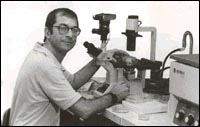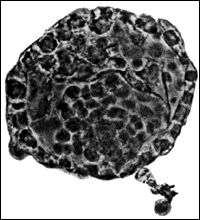
A Weizmann Institute scientist has shown that the injection of certain natural growth factors into pregnant mice helps prevent them from miscarrying. Dr. Boris Tartakovsky of the Institute's Department of Chemical Immunology found two growth factors, or cytokines, that dramatically reduce miscarriages among mice that are naturally prone to abort, as well as among normal mice injected with an abortion-inducing substance.
The findings may help shed light on the cause of many unexplained cases of repeated miscarriages and infertility among women. It is also hoped that the research could eventually lead to techniques for improving the success rate of in-vitro or test-tube pregnancies.
These studies are an outgrowth of Dr. Tartakovsky's earlier work which led to the discovery of a particular cytokine, CSF-1, that impairs fertility in mice. Since some cytokines block the action of others, Tartakovsky sought to identify growth factors that might possibly promote pregnancy. He eventually found two: tumor necrosis factor-alpha (TNF-a) a pro-inflammatory substance produced by many tissues, and granulocyte macrophage colony stimulating factor (GM-CSF), a promoter of white blood cell production.
Tartakovsky's experiments showed that the abortion-inducing effects of CSF-1 could be largely overcome by parallel injections with pregnancy-promoter GM-CSF. He also demonstrated that TNF-a dramatically reduced miscarriages in a strain of mice highly prone to spontaneous abortions. Moreover, CSF-1-induced embryo damage was found to occur before embryo implantation, and correcting this effect must be attempted at an early phase if the embryo is to be salvaged.
This latter finding could have implications in human test-tube embryo implantation and may suggest a possible strategy for improving the low success rate (about 20%) associated with this procedure.
Dr. Tartakovsky holds the Pauline Recanati Career Development Chair in Immunology.

